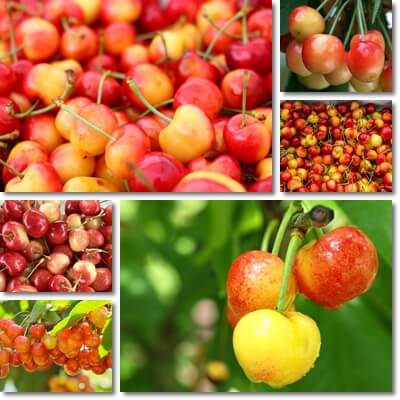Rainier cherries are a variety of sweet cherry. They’re yellow and blushed with red on one side, fleshy and sweet tasting.
Compared to sweet red and black cherries, Rainier are a good source of carotenoid antioxidants, but low in anthocyanins. The nutrition of Rainier cherries is marked by a modest content of vitamins A and C, potassium, iron, magnesium and manganese.
Eating Rainier cherries is good for the heart and blood pressure, combats constipation naturally and even aids sleep.
Rainier cherries help with weight loss and have anti-inflammatory effects, with benefits for arthritis joint pain, gout and other inflammatory conditions.
What are Rainier cherries?
The Rainier cherry is a bicolor variety of cherries (yellow and red) belonging to the Prunus avium species, or the sweet cherry. It is a hybrid cherry tree, obtained by crossing the Bing cherry and the Van cherry. The Rainier cherry is suited for hardiness zones 4 throughout 9, making it a hardy tree that tolerates the winter cold spectacularly (down to -35 degrees Celsius in extreme cases). The tree is also adaptable to a range of growing conditions, including different soil types. In addition to adaptability to the growing zone, the variety is also prolific, fruiting early and producing a bountiful harvest.

However, the fruits themselves spoil easily and are sensitive to rain, wind and temperature variations which may cause the fruits to fall off the tree. The Rainier cherry tree is available for sale in most nurseries and growing Rainier cherries is relatively easy. The only significant requirements are to have at least a couple of compatible cherry trees (e.g. Bing cherry) to ensure pollination and generous fruit bearing, and to space the Rainier to allow for full sun exposure. As for size, the Rainier cherry tree can grow from 4 to up to 10 meters high, and is also quite wide.
What do Rainier cherries look like?
Rainier cherries have a spectacular, easily identifiable appearance: they’re light to medium yellow blushed with red or pink-red on one side, with the ratio of yellow-to-red varying among fruits. The fruits are round or lightly heart-shaped, with a thin furrow on one side, along the length of the fruit. The skin is thin and smooth, and the flesh is light yellow and crisp – fresh, firm and juicy. Rainier cherries are meatier than other cherries which contributes to their appeal.
Each fruit has one smooth, hard-shelled, brown stone or pit in the center enclosing one white, bitter seed. Rainier cherries can be seen growing in clusters, which is characteristic of the fruit species.
What do Rainier cherries taste like?
Rainier cherries are one of the more sweet-tasting cherry varieties. Actually, some find Rainier cherries to have the sweetest taste of all cherries. When perfectly ripe, they are sweet and pleasant, with fruity notes and little to no acidity. The skin is thin and bruises easily.
The flesh is crisp: fresh, firm and juicy. If the cherries are not ripe, their flavor profile may record faint bitter flavors. Rainier cherry kernels or seeds taste bitter and are best not consumed, at least not too frequently or in too large amounts because they contain a toxin called amygdalin.
Rainier cherry season starts towards the end of June – beginning of July. Depending on the region where the cultivar is grown, climate and weather conditions, Rainier cherry season may last till August so there’s plenty of time to enjoy the fruit. Nowadays you can find fresh Rainier cherries for sale at almost any supermarket and at farmer’s markets, especially in areas where the fruit is grown commercially.

Rainier cherries nutrition information
The nutrition of Rainier cherries is the nutrition of the sweet cherry, with a few exceptions, most notably antioxidant profile and content. Because Rainier cherries are actually a sweeter variety of sweet red cherries, their nutritional value is considered, by and large, to be that of sweet red cherries.
Rainier cherry nutrition facts per 100 g:
- Energetic value: 60+ kilocalories (kcal)
- Fat: 0.2 g
- Protein: around 1 g
- Carbohydrates: 19 g
- Sugars: 13.5+ g (Rainier cherries are known to be the sweetest cherry variety, with a reported sugar content of up to 20%)
- Dietary fiber: around 2 g
Vitamins in Rainier cherries:
- Vitamin A: exact content is undetermined, but presumed higher than in red and black cherries (Rainier cherries are higher in carotenes that are precursors of vitamin A)
- Vitamin B1: 0.027 mg
- Vitamin B2: 0.033 mg
- Vitamin B3: 0.154 mg
- Vitamin B5: 0.199 mg
- Vitamin B6: 0.049 mg
- Choline: 6.1 mg
- Vitamin B9: 4 mcg (micrograms)
- Vitamin B12: 0 mcg
- Vitamin C: 9.6 mg
- Vitamin D: 0 mcg
- Vitamin E: 0.07 mg (trace amounts)
- Vitamin K: 2.1 mcg
Minerals in Rainier cherries:
- Calcium: 13 mg
- Copper: 0.06 mg
- Iron: 0.36 mg
- Magnesium: 11 mg
- Manganese: 0.07 mg
- Phosphorus: 21 mg
- Potassium: 222 mg
- Selenium: 0 mcg
- Sodium: 0 mg
- Zinc: 0.07 mg
Note: For the most part, Rainier cherries have a nutritional profile and nutrient values similar to sweet red cherries.
Antioxidants in Rainier cherries
The color of our food is indicative of the presence of specific antioxidants. In the case of Rainier cherries, the yellow and red-blushed skin indicates the presence of yellow, orange and red carotenoid antioxidants such as carotenes (e.g. beta-carotene, alpha-carotene, beta-cryptoxanthin), xanthophylls (e.g. lutein, zeaxanthin), and low amounts of anthocyanins in the skin only.
Other antioxidants in Rainier cherries include: quercetin, queritrin, epicatechin, catechin, ellagic acid, chlorogenic acid, caffeic acid, syringic acid, coumaric acid, ferulic acid, rutin, gallic acid, neochlorogenic acid, p-coumaroylquinic acid and many other phenolic acids and polyphenols.
What are the benefits?
Whether you eat yellow-red Rainier cherries or red cherries or black cherries, you pretty much get the same range of health benefits. Here are the top health benefits of Rainier cherries:
- Benefits for constipation. Rainier cherries and cherries in general have mild laxative properties and help relive constipation naturally.
- Benefits for weight loss. Rainier cherries are low-calorie and low-fat and eating them as part of a varied and balanced diet can help with healthy weight loss.
- Prebiotic benefits. Fresh Rainier cherries are a source of prebiotic benefits, feeding good gut bacteria for a healthier gut environment and better digestive health.
- Minor benefits for blood pressure. Providing 5% of potassium daily requirements per 100 g serving, 3% of magnesium, and naturally sodium-free, Rainier cherries help lower high blood pressure number.
- Benefits for teeth and gums health thanks to a good vitamin C content which promotes the health of connective tissue. Vitamin C deficiency manifests as bleeding gums and tooth loss.
- Good food to eat for stomach upset. Low-acidic and sweet, hydrating and a source of essential minerals and vitamins, Rainier cherries have a revitalizing effect and are gentle on the stomach.
- Good for diabetes. Rainier cherries are naturally higher in carbs and sugar than other cherry varieties, but they have a low to moderate glycemic index and, if eaten in small amounts, they don’t raise blood sugar levels too much too fast which makes them good for diabetes. If eaten in large amounts, Rainier and other cherries can raise blood sugar (glucose) levels.
- Help with sleep. Rainier cherries and cherries in general hold minor benefits for sleep. Eating Rainier or other cherries or drinking cherry juice can help increase sleep time and improve sleep quality. Find out more about the benefits of cherries and cherry juice for sleep.
- Antioxidant benefits. Source of pigmented carotenoids and other antioxidants, Rainier cherries have free radical-scavenging properties and help prevent and repair cell damage caused by oxidative stress, exerting antioxidant and reparative effects at cell level, as well as anti-proliferative, anti-tumor, anticarcinogenic effects.
- Antiaging properties. Source of vitamin C, vitamin A, iron, copper, manganese, carotenoids and other antioxidants, Rainier cherries help repair cell damage caused by oxidative stress and delay premature aging, exerting antiaging benefits. Vitamin C further restores skin elasticity and supports collagen production for more youthful looking skin.
- Benefits for arthritis pain. Anti-inflammatory benefits owed primarily to antioxidants such as vitamin C, carotenes, anthocyanins and other antioxidants recommend Rainier cherries and especially red and black cherries for the management of inflammatory conditions such as arthritis. Find out more about the consumption of cherries and cherry juice for arthritis pain.
- Benefits for gout. Rainier cherries are low-purine foods and a source of antioxidants with anti-inflammatory benefits which makes them a good food to eat for gout.
Find out more about the benefits of cherries and cherry juice for gout.
What are the side effects?
- Allergic reaction. Eating Rainier cherries can cause an allergic reaction with symptoms such as hives, itching or tingling sensation in the mouth or back of the throat, swelling of the lips, tongue or throat, breathing difficulties, wheezing, closing of the airways, digestive upset, low blood pressure and, ultimately, anaphylactic shock. Proteins in the fruit known as PR or Pathogenesis-related proteins are responsible for the allergic reaction. If you are allergic to Rainier cherries, you might also be allergic to regular red or black cherries. Find out more about cherry allergy.
- Diarrhea. Rainier and other cherries can cause loose stools and diarrhea if eaten in excess or if you have a dietary intolerance to components occurring naturally in the fruit such as the sugar alcohols sorbitol or mannitol.
- Stomach upset. Eating too many Rainier cherries or having a sensitivity or intolerance to components occurring naturally in the fruit, such as some sugars, can lead to stomach upset and associated symptoms such as stomachache or pain, bloating, burping, hiccups and give you gas.
